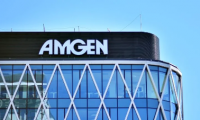-
Amgen and AstraZeneca ponder label expansion for Tezspire in COPD
- Source: drugdu
- 71
- May 22, 2024
-
FDA Grants Accelerated Approval to Amgen’s Imdelltra for the Treatment of Adults with Extensive-Stage Small Cell Lung Cancer
- Source: drugdu
- 81
- May 21, 2024
-
Amgen reports a 22% increase in Q1 2024 net revenues
- Source: drugdu
- 115
- May 6, 2024
-
Amgen Puts Its Weight Behind Obesity Drug With Potential Edge Over Lilly, Novo Nordisk Meds
- Source: drugdu
- 111
- May 6, 2024
-
FDA Approves Sandoz Biosimilars for Two Blockbuster Amgen Bone Drugs
- Source: drugdu
- 133
- March 7, 2024
-
Amgen swings into golf sponsorship, rebadging ex-Horizon deals under its branding
- Source: drugdu
- 180
- January 2, 2024
-
Amgen’s request for full approval of Lumakras in lung cancer denied by FDA
- Source: drugdu
- 220
- January 1, 2024
-
Amgen’s request for full approval of Lumakras in lung cancer denied by FDA
- Source: drugdu
- 133
- December 29, 2023
-
Amgen and MSD-backed start-up wins $10m for drug and device development
- Source: drugdu
- 140
- December 2, 2023
-
Amgen scores FDA approval for Stelara biosimilar
- Source: drugdu
- 98
- November 3, 2023
your submission has already been received.
OK
Subscribe
Please enter a valid Email address!
Submit
The most relevant industry news & insight will be sent to you every two weeks.













